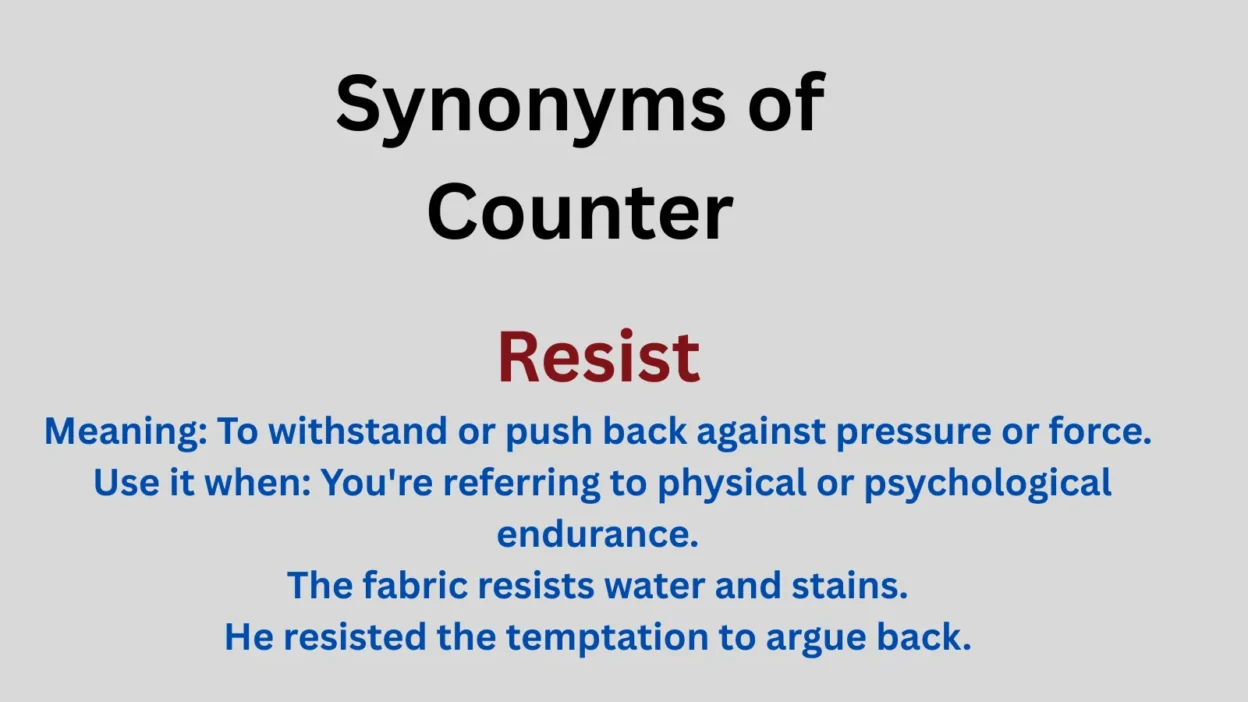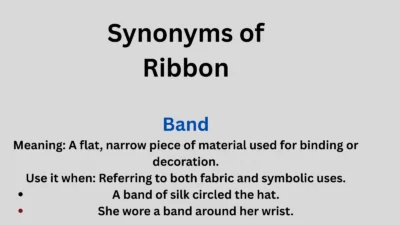Synonyms of Counter include powerful words like oppose, resist, defy, and respond, each capturing a different way to act against or react to something. If you’re writing about arguments, strategies, or actions, choosing the right synonym helps convey the exact tone and intention.
For example, oppose emphasizes direct disagreement, while respond may suggest a more balanced reply. In this guide, we’ll explore the most useful alternatives to “counter” and how to use them effectively across different situations.
Expanding your vocabulary with these synonyms of counter will make your writing sharper, clearer, and more impactful.
30 Synonyms for Counter (Meaning: Oppose or Respond to)
1. Oppose
Meaning: To actively resist or fight against something.
Use it when: You need a direct, often serious alternative to counter.
- She opposed the new policy in the meeting.
- They strongly oppose the expansion plans.
2. Resist
Meaning: To withstand or push back against pressure or force.
Use it when: You’re referring to physical or psychological endurance.
- The fabric resists water and stains.
- He resisted the temptation to argue back.
3. Refute
Meaning: To prove something wrong through evidence.
Use it when: You want a formal or logical tone, especially in debate.
- The scientist refuted the claims with data.
- He quickly refuted the allegations.
4. Rebut
Meaning: To contradict or respond with opposing evidence.
Use it when: You’re in a formal argument or court setting.
- She rebutted his testimony with a witness.
- He rebutted each accusation skillfully.
5. Respond
Meaning: To reply or react, often calmly or thoughtfully.
Use it when: You want a neutral or diplomatic tone.
- He responded to the criticism with grace.
- The company responded to the market changes swiftly.
6. Challenge
Meaning: To question or confront something directly.
Use it when: You want to show boldness or critical thinking.
- She challenged his assumptions.
- They challenged the decision in court.
7. Contradict
Meaning: To state the opposite or show inconsistency.
Use it when: Highlighting conflicting information.
- His actions contradict his words.
- The data contradicted the theory.
8. Dispute
Meaning: To argue against or question the truth of something.
Use it when: You’re discussing conflict or legal issues.
- They disputed the ownership of the land.
- He disputed the accuracy of the report.
9. Deny
Meaning: To reject the truth or existence of something.
Use it when: You’re dealing with accusations or claims.
- She denied any wrongdoing.
- He denied the charges completely.
10. Retort
Meaning: To reply quickly and sharply.
Use it when: You want a witty or snappy comeback.
- “I don’t need help,” he retorted.
- She retorted with sarcasm.
11. Counteract
Meaning: To neutralize or cancel the effect of something.
Use it when: You’re talking about effects or consequences.
- The medicine counteracts the poison.
- They introduced a policy to counteract inflation.
12. Counterbalance
Meaning: To offset or make up for something else.
Use it when: You’re referring to restoring balance.
- Her kindness counterbalances his harsh tone.
- The weight counterbalanced the load.
13. Neutralize
Meaning: To cancel out or make ineffective.
Use it when: Discussing military, chemical, or strategic contexts.
- The troops neutralized the threat.
- Baking soda neutralizes acidity.
14. Parry
Meaning: To deflect or ward off, especially in fencing or argument.
Use it when: You’re aiming for a more vivid or physical metaphor.
- He parried the question with humor.
- She parried the attack skillfully.
15. Block
Meaning: To stop or obstruct something.
Use it when: You want a straightforward, physical word.
- He blocked the opponent’s punch.
- The firewall blocks suspicious traffic.
16. Retaliate
Meaning: To strike back after being wronged.
Use it when: Emphasizing revenge or retribution.
- They retaliated after the attack.
- He refused to retaliate out of principle.
17. Repress
Meaning: To hold back or suppress something.
Use it when: Referring to emotions, urges, or uprisings.
- She repressed her anger.
- The regime repressed dissent.
18. Offset
Meaning: To compensate for or balance out.
Use it when: Talking about economics or practical effects.
- The gains offset the losses.
- The carbon tax helps offset emissions.
19. Contest
Meaning: To formally dispute or challenge.
Use it when: Discussing elections or legal matters.
- He contested the election results.
- The will was contested in court.
20. Push back
Meaning: To resist or push against something figuratively.
Use it when: Speaking casually or about pressure.
- The employees pushed back against the changes.
- She pushed back on the proposal.
21. Rejoin
Meaning: To reply, often in a sharp or witty way.
Use it when: You’re using dialogue or literature.
- “You’re wrong,” she rejoined.
- He rejoined with a clever remark.
22. Defy
Meaning: To openly resist or challenge authority.
Use it when: Talking about bold or rebellious actions.
- They defied the curfew.
- She defied expectations.
23. Answer back
Meaning: To reply defiantly or rudely.
Use it when: Describing disrespect or defiance.
- Don’t answer back to your teacher.
- He answered back with attitude.
24. Return fire
Meaning: To retaliate or respond aggressively.
Use it when: Using military or metaphorical language.
- The soldiers returned fire immediately.
- The politician returned fire during the debate.
25. Recompense
Meaning: To make amends or repay.
Use it when: Talking about compensation or justice.
- He recompensed the damage.
- She was recompensed for her loss.
26. Redress
Meaning: To set right or compensate for a wrong.
Use it when: You want a formal or legal tone.
- Victims sought redress in court.
- The government aims to redress historical injustices.
27. Answer
Meaning: To reply or respond.
Use it when: You want a simple, neutral tone.
- She answered calmly.
- He answered with confidence.
28. Repel
Meaning: To drive back or reject forcefully.
Use it when: Referring to physical force or emotional response.
- The troops repelled the attack.
- His arrogance repelled others.
29. Match
Meaning: To equal or counter with the same strength.
Use it when: Comparing two forces or arguments.
- She matched his energy in the debate.
- The donation matched last year’s amount.
30. Rejoin issue
Meaning: To take up an argument again.
Use it when: Using formal or legal rhetoric.
- He rejoined issue with the opposing counsel.
- The article rejoined issue on the topic of climate change.
How to Choose the Right Synonym for Counter
Tone Matters
- Formal/Academic: Refute, rebut, contest
- Casual/Everyday: Push back, respond, answer
Emotional Weight
- High-Conflict: Retaliate, defy, repel
- Neutral/Analytical: Offset, counterbalance, respond
Contextual Use
- Debate/Arguments: Rebut, retort, challenge
- Military/Strategy: Return fire, neutralize, parry
Conclusion
The word counter can imply opposition, reaction, or defense, depending on the context. By exploring synonyms like oppose, resist, challenge, and respond, you gain the tools to express confrontation or reply with greater precision.
Each synonym carries its nuance, allowing you to match the tone and intent of your message more effectively.
If you’re discussing debates, strategies, or everyday responses, using the right alternative to “counter” strengthens your communication and enhances clarity.





